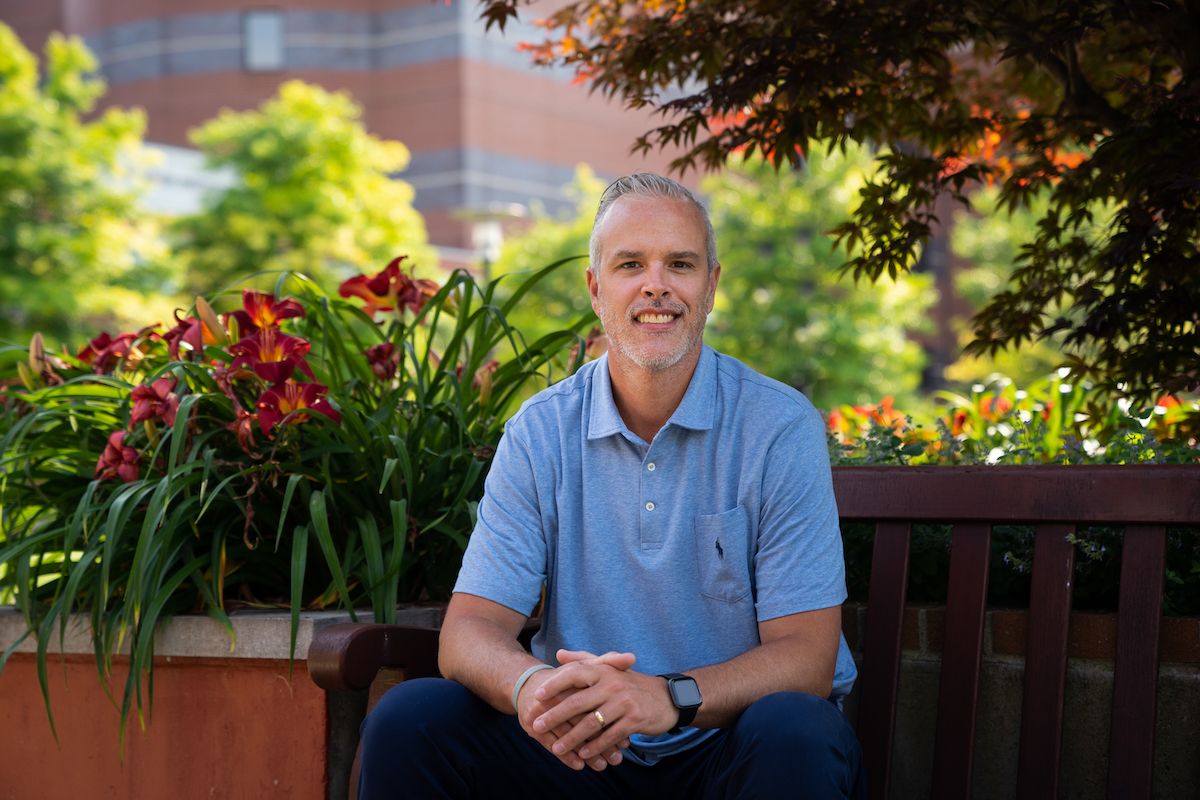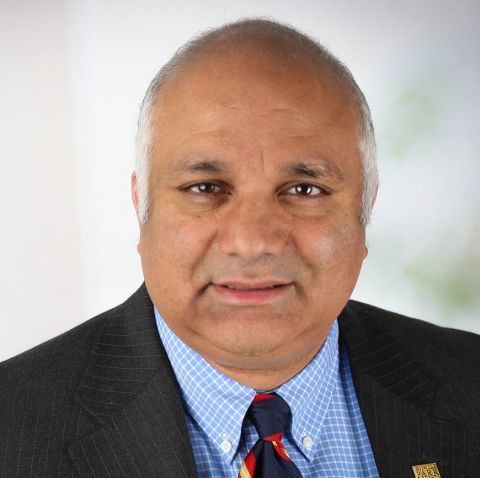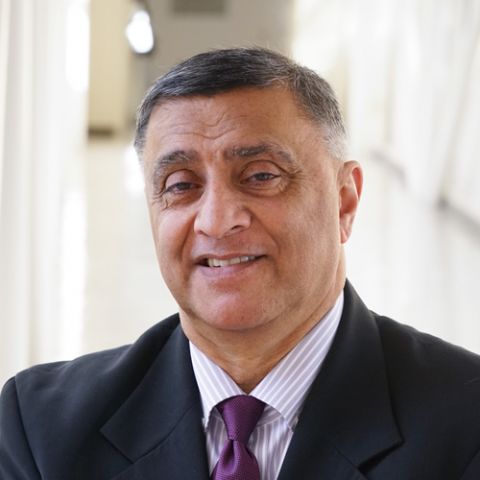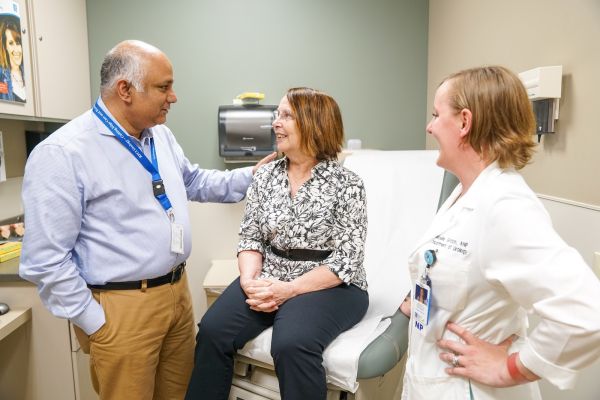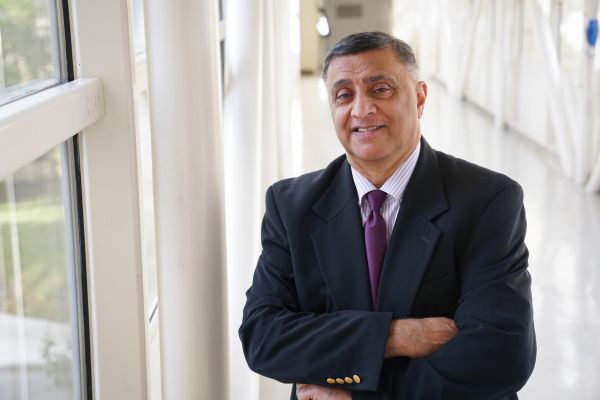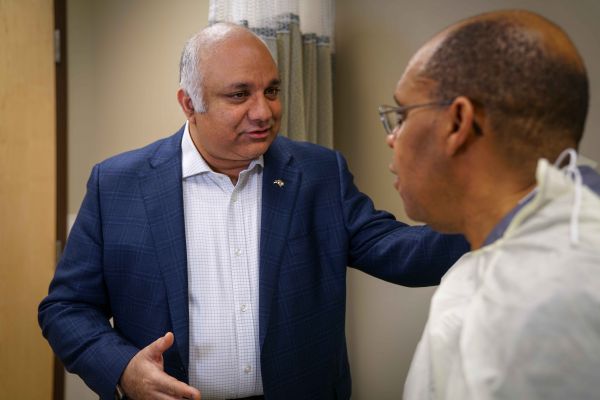Describing his experience with bladder cancer and learning to live with a neobladder, James Stevens says, “You take the bad with the good. The bad included chemotherapy and major surgery to remove my bladder; having to catheterize myself; and, at 38 years old, learning all over again how to control my urination."
But then James describes the good: “I tell people that when they look up and see that Roswell Park building at Elm and Carlton streets in Buffalo, to think about the people inside looking out. They are all seeking hope that cancer can be defeated. For me, that hope became reality. Inside that building, the doctors, nurses and staff saved the life of this very grateful husband and father of nine-year-old twin girls.”
Heeding an important warning sign
James’ cancer story started in April 2020. “I noticed a little blood in my urine,” James recalls. “I’m not one who usually goes to the doctor right away, especially during a pandemic. I was only 38 and have always been active and healthy. And because there was no pain, I didn’t think it was anything too serious.” However, since kidney stones run in his family, James described his symptoms in an email to his primary care physician. “My doctor ordered a CT scan. Because I am relatively young, I think we were both pretty surprised when the results showed that I had a mass in my bladder,” James says.
Khurshid Guru, MD, Chair of Roswell Park’s Department of Urology, however, might not have been surprised to hear this news. “Blood in the urine, along with painless urination, is one of the most common symptoms of bladder masses. No matter your age, if you are having any symptoms, like blood in your urine, and especially if your urination is painless, you must be evaluated by a doctor,” says Dr. Guru. “We can then determine the cause and treat it appropriately. If people follow this advice, we can save hundreds of lives.”
James soon underwent a transurethral resection of bladder tumor (TURBT) procedure, in which a tool called a resectoscope is inserted through the urethra to reach the inside of the bladder and biopsy the tumor. The pathology confirmed it was stage 2 cancer. "My doctor told me, ‘You’re young and you can fight this.’ He recommended I begin aggressive treatment on this right away, and he told me that for robotic bladder cancer surgery, there is nobody better than Dr. Guru,” James says.
Because of the COVID restrictions in place at the time, James and his wife LouAnn had their first visit via telemedicine with Roswell Park’s bladder cancer team, including Dr. Guru, Gurkamal Chatta, MD, Clinical Chief of Genitourinary Medicine.
“They already had reviewed my records and Dr. Guru recommended that I undergo a cystectomy (removal of the entire bladder) via robotic surgery – which typically results in less blood loss and faster recovery than a traditional operation that involves a large incision,” James says. “I had the option of an external urine collection device or a neobladder to take over the work of the bladder and allow urine to exit from the body.”
Dr. Guru explained that the neobladder is a pouch created from part of the small intestine to collect urine inside the body and allow it to exit through the urethra. He also explained that James would be a good candidate for this option, since his kidneys worked well, his tumor was not near his urethra, he was physically fit and able to get out of bed to relieve himself and he was willing to undergo the training to recognize when and how to empty the neobladder when it was full.
Within minutes of hearing the options, “there was no looking back,” James says.
“I chose the neobladder, and LouAnn supported my decision. I was ready to get on with my life.”
The right treatment in the right order
Dr. Chatta explained that James would undergo four sessions of neoadjuvant chemotherapy – chemotherapy before surgery – to help shrink the tumor, make surgery to remove it easier, and treat any micro-metastatic disease – cancer cells that have escaped the bladder but cannot be seen on scans. Neoadjuvant chemotherapy has been shown to increase the cure rate by as much as 10 to 30% in patients with bladder cancer that has invaded the muscle wall.
A week later, James started chemotherapy.
“The first couple of sessions were so ‘easy’ that I overestimated my strength. By the last two sessions, I was weak and tired. While I was able to work remotely at my job, LouAnn stepped in and took over most of the workload at home.”
Why Roswell Park for bladder cancer treatment?
Find out more about what makes Roswell park unique in diagnosing and treating bladder cancer.
In the weeks prior to surgery, a GU nurse taught James how to self-catheterize, a skill he would need to collect his urine until he had adjusted to using the neobladder. In August 2020, James underwent the operation for the radical cystectomy and construction of the neobladder. The operation by Dr. Guru and his team took nine hours.
“I recovered at Roswell Park for eight days. I started walking the day after surgery, and by the fifth day, I was so tired of sitting around, I was wearing holes in those green socks they give you, walking multiple laps around the floor,” James says with a laugh.
Two weeks after his surgery, James returned to the clinic and received training to recognize the sensation of a full neobladder and how to empty it by pushing on the abdominal wall and bearing down to release the urine.
“It took some time to learn, and it wasn’t easy,” he recalls. But now, less than a year after his surgery, James is back to lifting weights, playing basketball and spending quality time with his family.
“My family has been amazing, especially LouAnn. She has been with me on every office call, every clinic visit, and every follow up,” James says. “LouAnn was such a major part of my story from the very beginning of this process. I know I made it sound like I was tough and I got through it, but I couldn’t have gotten through this without her.”
Editor’s Note: Cancer patient outcomes and experiences may vary, even for those with the same type of cancer. An individual patient’s story should not be used as a prediction of how another patient will respond to treatment. Roswell Park is transparent about the survival rates of our patients as compared to national standards, and provides this information, when available, within the cancer type sections of this website.
